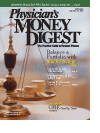Publication
Article
Remember: Money Isn't Who You Are
Author(s):
Physician's Money Digest
reader Dr. SusanDonaghey wrote the following in referenceto my recent column "Does MD Stand forMillion Dollars?":
I was 1 of those who thought MD meant rich. I weepwhen I think of all the money I wasted. I spent like theQueen of Sheba. Now the gravy train has dried up. I wasforced to define "wants" and "needs." In defining thosethings, I came to define myself. "Stuff" and "image" thatI bought were attempts to increase my own feeling ofself-worth. Now I've paid off all my credit cards and amready to start a retirement plan.
I used to feel like the "odd man out" in the physiciandining room—no fancy, schmancy house, car, orcountry club for me. Now I am not ashamed of myway of life anymore and feel liberated not chasinglabels and high-tech toys. My self-worth increased. Itcomes from inside and from my family and doesn'tdepend on spending at all.
Reader's Insights
I think Dr. Donaghey hit the nail on the head. Shelearned 2 important lessons. First, you can't let your possessionsdefine who you are. And second, you can't spendyour way to wealth. The question she doesn't answer is:Why do doctors equate having expensive possessionswith enhanced self-worth? Ours is a profession with along history of sacrifice. Doctors are the last people you'dthink would fall for the fantasy that our possessionsdefine who we are. Consider the following:
- One of the best doctors in Saginaw, Mich, drives a20-year-old clunker. Most of his medical students drivebetter cars than he does. Yet no one ever teases him abouthis car. They have too much respect for him.
- One of my friends, and also 1 of the best doctors inSaginaw, drives a Jaguar. He gets teased quite a bit.
- My physician's assistant drives a new Corvette. Mypatients all assume it's mine and tease me about it: "I seeyou're driving that flashy car." Aside, they seem to say:"Maybe you're charging too much for my office call."
Much of our lives are spent with patients. Ask yourselfthe question: While in your office or the hospital, canyou on sight pinpoint the doctor who is rich? You wouldnot treat a rich doctor any different from a nonrich doctor,would you? And you wouldn't treat a rich patientany different from a nonrich patient, would you?
Real Value
Indeed, it seems essential that we, as doctors, separatethe financial from the patient care parts of our business.I don't want to know how much money a patient has;I only enquire to find out if they can afford to take themedicine I prescribe. It saddens me when my patients actdifferently toward me depending on their financial status.I've noticed, for example, that some patients:
- Treat me as just another vendor for services theyreceive. They think they're important because of theirwealth. They seem to know I can't be as wealthy as them.
- Demand more time and a higher level of service.
- Question what I do more often.
Ask their doctor friends about my care, and call meat night to chat about what these folks said.
Other patients seem to value the relationship, andtreat me with respect for what I do for them:
- They're more likely to take what I say as truth, andtake their pills without questioning my prescribing.
- They get their tests when I ask them to.
- They seem to be happy with their service. I've seenthem happy to get any level of service in some practices.
I'm reading between the lines of Dr. Donaghey's letter,but I suspect that she, now having seen the light, ismore upset about her previous neglect of her personal lifethan she is upset about the money she wasted. Shedefined herself by possessions and it detracted from whoshe really was as a person. I suspect that many rich folkshave not learned this lesson, and so find that their livesare less rich (in spirit) than they could be. You can't spendyour way to wealth, but you can certainly spend yourway to poverty. Along the path to poverty you:
- Neglect your family and become selfish.
- Neglect your personal development.
- Waste time worrying about "things"—time youcould use to become a better doctor and human being.
For those of us who are not rich, we'll have to save,plan, and invest. In some ways, who we are should be nodifferent from our nonwealthy patients. Perhaps theworst thing we could do in our career is to becomewealthy and enamored of our wealth. That would makeus seem better than our patients. And would we ever sacrificeourselves for the good of our patients then?
Louis L. Constan, a family practice physician inSaginaw, Mich, is the editor of the Saginaw CountyMedical Society Bulletin and Michigan FamilyPractice. He welcomes questions or comments at3350 Shattuck Road, Saginaw, MI 48603; 989-792-1899; or louisconstan@hotmail.com.
